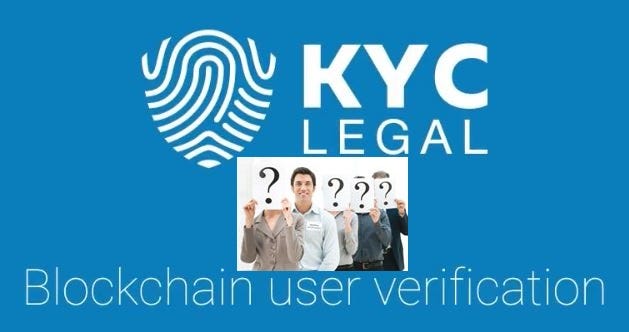KYC.LEGAL — Project and ICO Summary Know Your Customer Blockchain Identity Verification . . .

Project Information
KYC.Legal — Service that allows to verify users and to prevent fraud. It is based on blockchain technology as a tool for protecting and validating personal data of Internet users. This innovative solution will cut down on verification time from the current several days or even weeks to just about 30 minutes from the time of the user registration on the platform to the arrival of the verification agent. KYC.LEGAL will work with numerous specialized agencies to verify its agents and conduct an in-depth check of the customers.
The platform involves the roll-out of a set of automated services divided them into two types: Self-identification services and agent-required verification services.
- Self-identification, or self-verification of personal data: KYC.LEGAL allows user to verify provided data through a simple code generation process to confirm the validity of entry.
- Verification through certified agents: many KYC verification cases require a third party — a certified agent — to prove a user’s identity. KYC.LEGAL addresses this problem by creating a global network of licensed verified agents (present in first 20 major megapolises by 2020) capable of providing verification on demand in under 30 minutes after your request, arriving wherever you are.
The product will be available in App Store and Google Play in the coming weeks. This app will allow users to order agent verification and a courier service for the delivery of legal documents
The limitations of the equipment
Even modern powerful computers are the limits of their capabilities. The storage servers have a limit, exceeding which can lead to the loss of old or rarely used information. It is also possible the power failure of the server or reaches the limit of its capabilities, leading to disruption of its correct operation and data loss.
Even modern powerful computers are the limits of their capabilities. The storage servers have a limit, exceeding which can lead to the loss of old or rarely used information. It is also possible the power failure of the server or reaches the limit of its capabilities, leading to disruption of its correct operation and data loss.
Value
The data is stored, as they have value. The data stored by users may include passwords, account data, medical records, information about loans, financial and other information important for a human being and therefore has value. The company can store in the cloud your documents and information. When the data lose their value, they can be removed.
The data is stored, as they have value. The data stored by users may include passwords, account data, medical records, information about loans, financial and other information important for a human being and therefore has value. The company can store in the cloud your documents and information. When the data lose their value, they can be removed.
Obsolescence
If the data become obsolete or their location, method of storage or the responsible company is no longer required, the entire data packet may be lost forever. The risk for our generation, who scored their wardrobes CDs, is that if we move to a new form of online data storage, the information stored with the current ways will be lost.
If the data become obsolete or their location, method of storage or the responsible company is no longer required, the entire data packet may be lost forever. The risk for our generation, who scored their wardrobes CDs, is that if we move to a new form of online data storage, the information stored with the current ways will be lost.
Delete the account
Many of the data that is stored online, tied to accounts. If you’re looking for an article or a picture and can’t find a good chance that the account was deleted. This could be done intentionally, but usually it happens in connection with the freezing of the account due to unauthorized use.
Many of the data that is stored online, tied to accounts. If you’re looking for an article or a picture and can’t find a good chance that the account was deleted. This could be done intentionally, but usually it happens in connection with the freezing of the account due to unauthorized use.
The intentional removal
Often the content removed from the Internet on purpose, and gets lost forever, unless it is stored somewhere else. The down side is the problem of deleting content at your request. If the content was spread virus or any other method to find and delete all of this content can be extremely difficult.
Often the content removed from the Internet on purpose, and gets lost forever, unless it is stored somewhere else. The down side is the problem of deleting content at your request. If the content was spread virus or any other method to find and delete all of this content can be extremely difficult.
Change links
Sometimes the content is lost, so how does the link to it. If a link was changed and it was not fixed, it may be difficult or impossible to find the content which is thus lost.
Sometimes the content is lost, so how does the link to it. If a link was changed and it was not fixed, it may be difficult or impossible to find the content which is thus lost.
How it works
The project is based on the blockchain technology that acts as an instrument for data protection and identity confirmation of the chain users.
Users add information to video and verify it. Then they look for verification agents close to them. Agents see and accept the incoming orders and arrive to continue the process. After users’ data is completely verified, agents get rewarded. Let’s see, how KYC legal adds value to both the information users and the service providers.
The advantages and disadvantages of online data storage
Online data storage is a problem for companies and organizations that collect data and those whose data is being collected. When you start to collect and store data, you should consider the legal and commercial requirements related to ethics, privacy, and economic efficiency. Data storage policy and storage are the key words in the business world, and managers discuss politics, retention periods, archive rules, storage formats, encryption, and access.
The aim of storage is to protect the rights, privacy and ethics in the preservation and organization of useful and necessary information for future use. An important point to any data retention policy is the Protocol for “irreversible removal”. We all know that deleted content is never really a remote as long as it’s not erased from the hard drive on which it is located.
A simple delete can erase the path to the location where the data is stored, and make room for new data that does not necessarily imply complete removal of data. Savvy computer technology can easily circumvent operating system and download the data stored on hard drives, if they were not physically damaged. Protocol “irreversible removal” may require storing data in encrypted form. In this case, the file can be found after removal, but without the encryption key to access it will be impossible.
To improve the efficiency of this protocol, the encryption keys must also be removed to ensure that access to the original and any copies would be impossible. In online data storage, there are physical limitations. Servers become outdated and wear out, need to be replaced.
A huge group of servers that control the “clouds” that actively generate heat and they need a giant fan and cooling system. Another problem is humidity, which can accelerate the oxidation process and chemical destruction of equipment or data, stored electronically, which represent not that other, as a very complex chain of magnetic ones and zeros. All this requires a lot of effort, space and money.
Among the many arguments against mass data retention by telecommunications companies and service providers there is the argument that terrorists and criminals can very easily hide in the Internet, which will lead to the ineffectiveness of the retention policy. The variety of ways that can benefit the Internet user to hide its presence on the Internet, are Internet cafes, P2P file sharing, the TOR network, digital caches and anonymous proxies.
The irony is that many of the tools used by criminals are the same tools that are used and huge corporations and the government to protect their connections, as well as users who do not want to leave the “digital evidence” of their actions on the Internet. One of the most effective means of protecting your data and information about you from the collection and storage of third party websites, individuals and organizations — is a VPN.
VPN, virtual private network, is a complex Protocol security elements developed during the creation of the Internet as we know it today. They combine the technology of IP masking and encryption to create secure connections that are difficult to find, difficult to crack and impossible to read. Available initially only to those who had the wealth, resources or knowledge, today VPN like anything in the Internet, available just one click of the mouse, through electronic subscription.
VPN digital way to “Repack” your data and connection requests, directing them then to the special servers. It performs two functions. First, it masks your original IP address by replacing it with a new, anonymous issued the VPN server. Secondly, a VPN bypasses the servers of your ISP, connecting directly to a VPN server in securely hiding you from prying eyes.
Now all connections are anonymous and hidden, extra protection — encryption of certain protocols. This means that only the websites that you visit will know you’re online, they won’t know who you are, and you will give them directly only the confidential information, the collection of which they can make.
There are moments that you need to confirm your identity in some institutions, or by buying products where you have to prove your age and documents will not be with you, then in this case, you can help project KYC legal where you can store your personal information and earn.
Roadmap
ICO Details
Platform — Ethereum
Token name — KYC
Amount of tokens — 42 000 000
KYC Price — Depends on participation time 1$ — 2,5$
Soft cap — 1,000,000 USD
Hard cap — 35,000,000 USD
Accepting — BTC, ETH, LTC, DASH, ZEC, Fiat

This is a legal service that offers services to entrepreneurs to identify users and to detect fraud. Based on blockchain technology as a tool to protect and validate personal data for internet users, KYC.LEGAL provides:
- Users: Painless and fast verification process, protection of personal information through encryption and biometric data, data hosting on user’s device, control over provided data, digital signature for document verification.
- Service providers / token holders: KYC compliance, reliable and secure user information, fraud prevention, ecosystem to interact with customers
Curious about KYC.LEGAL? Watch here:
More Info information visit:
Site https://kyc.legal
Whitepapper https://kyc.legal/WhitePaper-ENG.pdf
Twitter https://t.me/KYCLEGALru
Facebook https://www.facebook.com/KYCLegal/
Bitcointalk https://bitcointalk.org/index.php?topic=2370568.0
Whitepapper https://kyc.legal/WhitePaper-ENG.pdf
Twitter https://t.me/KYCLEGALru
Facebook https://www.facebook.com/KYCLegal/
Bitcointalk https://bitcointalk.org/index.php?topic=2370568.0






Komentar
Posting Komentar